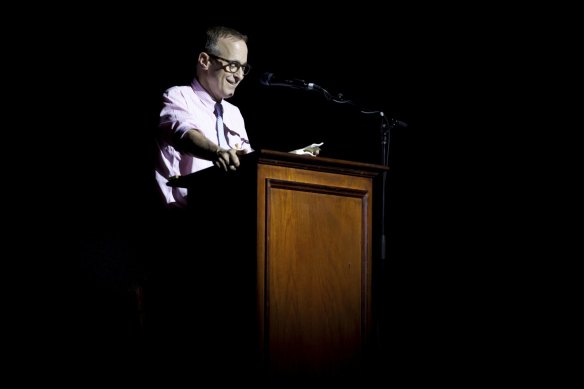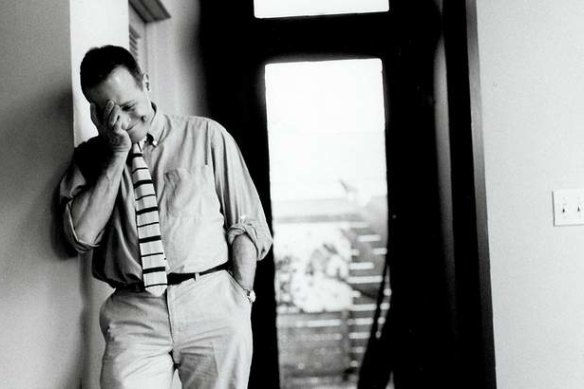
Before I get on the phone with David Sedaris, I’m given a warning. He’s coming to Australia this year for a series of shows, which is why we’re talking, but his promoter explains that he’s also currently in the midst of an American tour.
“He’s doing 50 cities in 50 days, a busy man,” she says. OK, sure, noted. “Oh, and he will be in the back seat of a car, driving between cities.” Back seat, car, got it. “Also, I’ve allocated half an hour for the chat, but if he likes you, he’ll talk for longer. Good luck!”
Conscious that if our conversation wraps after 30 minutes, I’ll know for sure he doesn’t like me, I try to sound as jovial as possible when America’s pre-eminent humorist answers the call. “Hello, Mr Sedaris! I hear you’re in a car; how is that?”

There’s a lot to cover with the world’s most observant humorist as he drives the few hours between Washington and Pennsylvania.
“I’m leaving Washington, DC, about two hours out of Hershey, Pennsylvania,” says Sedaris, the essayist’s trademark nasal drawl instantly recognisable. “It’s OK, I guess; I don’t mind being in a car.”
We agree that being in a car is fine, more relaxing than a plane, and not as noisy as a train, but I can’t shake the feeling that this is the exact kind of chat that will see me cut off at the half-hour mark. Thankfully, as is Sedaris’ style, he makes an observation that gets us rolling.
“One thing I can’t stand, though, is fast drivers who are fast for the sake of it. I was travelling recently, and the trip was supposed to take three hours, but the driver proudly told me he could do it in less,” he explains. “We arrived in two hours and 15 minutes, and I felt I needed to congratulate him? But I also felt very sick. I wasn’t in a rush, so what was the point?”
Sedaris, a regular contributor to The New Yorker, has made a living off these types of observations. Slices of life plucked from his real-world experience are jotted down and turned into best-selling books, which have sold more than 16 million copies in print and have been translated into 32 languages.
Sedaris is so successful that he can claim fans in high and holy places. Last year, he was summoned to the Vatican to meet Pope Francis alongside a collection of comedians and actors, including Stephen Colbert, Conan O’Brien, Whoopi Goldberg, Jimmy Fallon and Julia Louis-Dreyfus.
“It was so odd, but I mean, you have to go, right? If the Pope says he wants to meet with you, you can’t have other plans,” says Sedaris. “I invited my husband Hugh, but his brother was visiting, so he declined, and I thought to myself, ‘Well, sure, just catch up with the Pope next time.’ ”
Naturally, Sedaris turned the meeting into a story for The New Yorker, entitled My Audience with the Pope. “After his address, we were led up the aisle and personally greeted,” Sedaris wrote. “Standing before him, I felt the same pity I’d felt for the Queen and would feel for anyone who has to meet people for a living.”

David Sedaris will return to Australia next month for An Evening with David Sedaris.Credit: Daniel Boud
Sedaris has more in common with the Pope than perhaps he realises. Soon, he will return to Australia for An Evening with David Sedaris, two years after his last visit. The show only runs for 90 minutes, but you can be sure he will spend twice that long doing meet-and-greets with fans afterwards.
“I feel it’s different with the Pope; he is not profiting in any way for meeting people, whereas normally someone has bought a book they want me to sign, or they will tell me something funny I can use,” he says. “For me, the exchange ends when I hand the book back, but for the Pope, it’s just open-ended, having to do it all day, and people they meet are usually nervous wrecks.”
Perhaps surprisingly, in all the hours spent meeting people in cities across the globe, Sedaris claims he’s never had a bad fan experience. Awkward, maybe, but never awful.
“I sometimes give gifts, and I gave this nice young man a decorative knife I’d bought in Japan, then I asked him about the tattoos on his arms,” says Sedaris. “He told me he used to be a cutter, so the tattoos were a cover-up.”
Lines like this come thick and fast with Sedaris (we’ve been talking for more than 30 minutes, by the way), a blunt comment that purposefully lands with a thud. Flirting with the edge has long been part of his popularity, but it’s also become polarising in a post-cancel culture world.
Two years ago, Sedaris appeared on CBS Sunday Morning, during which he joked about the word queer. He lamented that he started as a homosexual, then became gay, then LGBT, and now queer. Within days a minor culture war erupted, driven by articles such as Why Does David Sedaris Fear the Word Queer?
“My point about the queer thing, and I thought it was a good one, was it’s the fourth time in my life I’ve been rebranded,” he says. “No one ever asks your opinion, but suddenly, you have a new label. I wasn’t saying anything against trans people or inclusion; my beef was just a linguistic beef.”
More recently, Sedaris was criticised for Punching Down, a piece he wrote in The Free Press, in which he, tongue firmly planted in cheek, posited society had become too sensitive, most likely because parents don’t hit their kids any more. “Who are these hothouse flowers, all so easily and consistently wounded?” he wrote. “People whose parents never hit them, that’s who.”
You can probably guess how that went down, but if you need more proof, just know there’s a Reddit thread called David Sedaris Advocates for Child Abuse. So, was he poking the bear or trying to make a point?

David Sedaris, a man whose humour is never black and white.
“The piece about hitting kids, I’ve been reading that out loud, and honestly, it gets massive laughs,” he says. “Obviously, I’m not really suggesting people beat their children, but even the idea of having to explain that doesn’t interest me. Occasionally, my publicist calls and tells me people are upset, but I never check social media or read my reviews.
“I wish we could get rid of the internet altogether; really, I do. It promised to make everybody smarter, and it’s just made everybody louder and dumber.”
Famous people love to claim they don’t look themselves up online, and it usually rings hollow, but Sedaris seems genuine. He is unaffected when I tell him that his most recent book, Happy-Go-Lucky, has a 4.17 rating on Good Reads, based on more than 44,000 mostly positive reviews.
“That’s nice, but the review that sticks with me was from a lady who approached me at a signing and said, ‘I want you to know I gave Happy-Go-Lucky a terrible review,’ as if she had written for The Boston Globe,” laughs Sedaris. “She told me I was out of touch, and I explained she doesn’t get to decide what ‘touch’ is.”
According to Sedaris, the exchange ended well, mainly because it was a real conversation between two actual people, something he believes doesn’t happen enough.
Loading
“We’re finding too many ways to avoid talking to each other, like Hugh and I were travelling recently, and we had no choice but to stop at McDonald’s,” he says. “And I was so disappointed to learn you order through the machine now; that’s another conversation I won’t get to have.”
On that note, Sedaris bids me farewell. Two hours have passed, and the Pennsylvania skyline is becoming visible from the back seat of his car.
An Evening with David Sedaris will tour Australia in February.
The Booklist is a weekly newsletter for book lovers from books editor Jason Steger. Get it delivered every Friday.



